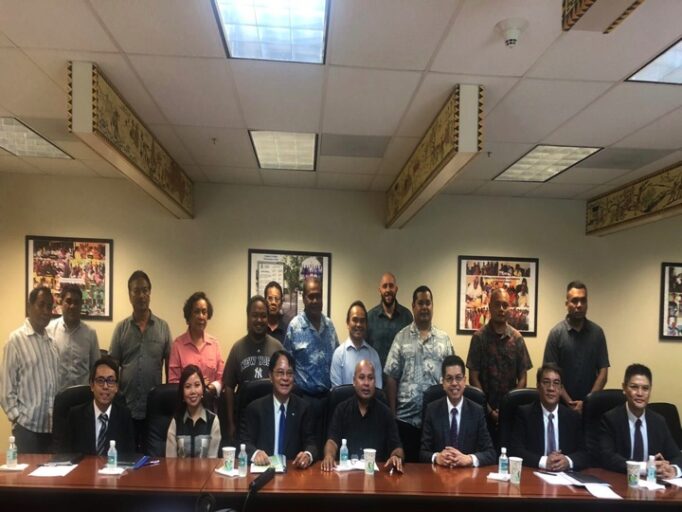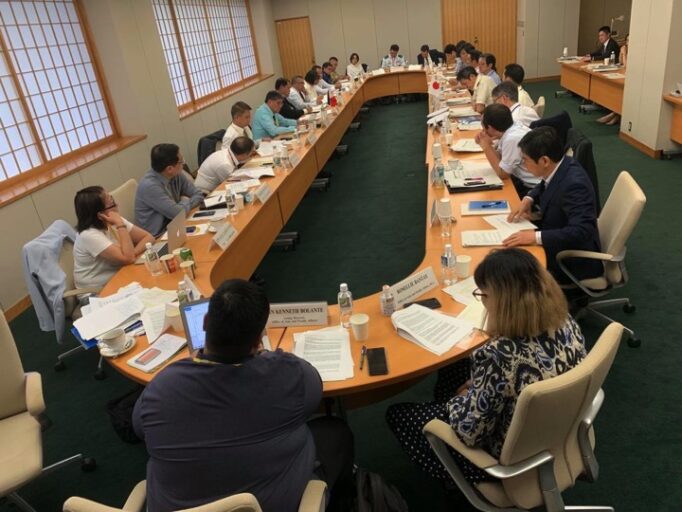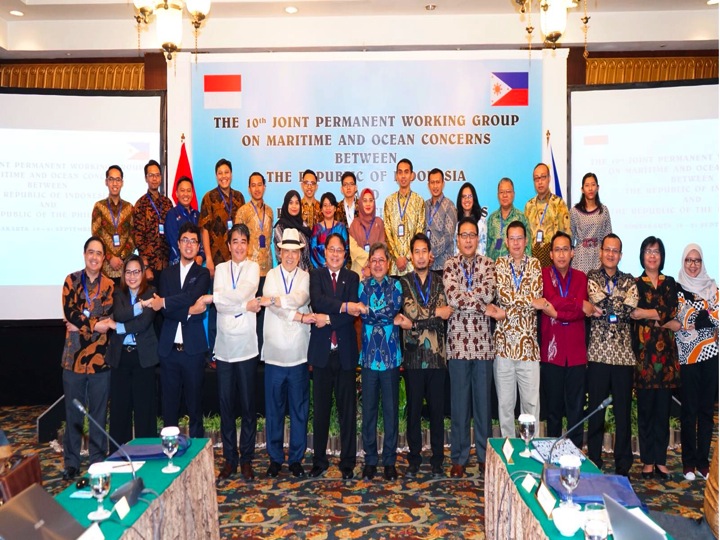As an archipelagic State, the Philippines’ maritime interests go beyond the West Philippine Sea / South China Sea, although it usually gets the most public attention. While promoting and protecting the rights of the Philippines in that area, the Department of Foreign Affairs, in particular the Maritime and Ocean Affairs Office, has also been tirelessly making efforts in addressing other maritime issues and concerns, and ensuring the security of all sides of the Philippine maritime domain – in the south with Indonesia, in the southeast with Palau, in the north with Japan, and in the west with Vietnam.
Philippines, Indonesia hold 10th maritime talks in Yogyakarta
The Philippines and Indonesia held the 10th Meeting of the Joint Permanent Working Group on Maritime and Ocean Concerns (JPWG-MOC) in Yogyakarta on 19-21 September 2019, reviving a key bilateral mechanism for the first time in 3 years.
The JPWG-MOC, which reports to the more senior Joint Commission on Bilateral Cooperation, was established to serve as the primary forum between the Philippines and Indonesia for exchange of views on maritime issues of mutual interest.
The two sides were boosted by the entry into force of the 2014 Agreement on EEZ Delimitation through an exchange of instruments of ratification by Foreign Secretary Teodoro L. Locsin and Indonesian Foreign Minister Retno Marsudi in Bangkok on 1-August-2019. The Agreement is expected to benefit both countries, economically and politically, by promoting more bilateral cooperation in the EEZ in order to advance the common interest of managing and preserving the resources in the EEZ and further strengthening maritime security cooperation between the two countries.
During the Meeting, the Philippine and Indonesian delegations discussed post-EEZ boundary delimitation issues, the joint co-production of navigational charts, delimitation of the continental shelf, cooperation on search and rescue, marine and fisheries cooperation, and efforts to combat illegal, unreported, and unregulated fishing (IUUF).

Delegations of the Philippines and Palau with members of the Palau National Congress at the 4th Technical Panel Meeting on the Maritime Boundaries between the Philippines and Palau, 13-14 November 2019 in Koror, Palau. (Photo from MOAO-Div 1)
Philippines, Palau hold 4th Technical Panel Meeting in Koror The 4th Technical Panel Meeting on the Maritime Boundaries between the Philippines and Palau was held on 13-14 November 2019 in Koror, Palau. The Philippines and Palau laid out their respective positions in view of the principles and processes in maritime boundary delimitation in accordance with international law, including the United Nations Convention on the Law of the Sea. Both sides agreed to continue further discussions with the objective of reaching a final resolution on the issue of maritime boundaries.

The Philippines and Japan held the 3rd Dialogue on Maritime and Ocean Affairs at the Ministry of Japanese Ministry of Foreign Affairs (MOFA) in Tokyo on 11 June 2019, back-to-back with the 8th Philippines-Japan Political-Military and Military-to-Military Meeting. (Photo by MOAO-Div1)
Revival of the PH-JP Dialogue on Maritime and Ocean Affairs
The Philippines and Japan held the 3rd Dialogue on Maritime and Ocean Affairs at the Ministry of Japanese Ministry of Foreign Affairs (MOFA) in Tokyo on 11-June-2019, back-to-back with the 8th Philippines-Japan Political-Military and Military-to-Military Meeting.
It was the first such Maritime Dialogue between the two countries in six years, having been prompted by a decision between Secretary Teodoro L. Locsin, Jr. and Japan Foreign Minister Kōno Tarō at a meeting in Davao in February 2019. The inaugural First Dialogue was held in Tokyo on 9-September-2011 to explore various areas of cooperation in the maritime sector focusing on maritime safety and security. The Second Dialogue was held in Manila on 22-February-2013.
Apart from a discussion of each country’s respective maritime concerns and experiences, the meeting was marked by the Philippines’ presentation of a proposal seeking Japan’s support in the establishment of an Asian Maritime University in the Philippines and Japan’s recounting of its best practices to preserve remote islands and develop the exclusive economic zones (EEZ).
Philippines, Viet Nam hold 8th maritime talks in Hanoi
The Philippines and Viet Nam convened the 8th Meeting of the Philippines-Viet Nam (PH-VN) Joint Permanent Working Group on Maritime and Ocean Concerns (JPWG-MOC) on 17-19 October 2019 at the State Guest House in Hanoi, reviving a key bilateral mechanism for the first time in eight years.
One of the key outcomes of the meeting was the proposal to conduct informal discussions on the two countries’ extended continental shelf (ECS) claims in the South China Sea. The Philippines and Viet Nam also discussed cooperation on maritime law enforcement, fisheries, scientific research, and marine environment protection.
First held Manila in 2004, the 6th Director General-level JWPG-MOC was held in Manila on 24-25 January 2011 and the 7th was held in Ho Chi Minh on 15-16 August 2011.
Following a decision at the 6th Joint Commission for Bilateral Cooperation held in Hanoi on 5-6 October 2011 to elevate the mechanism to Vice-Ministerial level, the two countries held the 1st Joint Commission on Maritime and Ocean Cooperation (JC-MOC) in Manila on 20-February-2012 and the 2nd JC-MOC in Hanoi on 14-September-2015, thus putting the JPWG-MOC into hiatus until 2019.
PH asserts its maritime rights in diplomatic notes to UN
On 06-March-2020, the Philippines submitted to the UN Secretary-General communications stating its position on Malaysia’s submission on 12-December-2019 of its extended continental shelf (beyond 200 nautical miles) to the Commission on the Limits of the Continental Shelf (CLCS) through Note Verbale No. 000192-2020, and its position on China’s response on the same day to Malaysia’s submission through Note Verbale No. 00191-2020.
The Philippines rejected the assertion of maritime claims that are not in accordance with international law, including the UN Convention on the Law of the Sea (UNCLOS), and are inconsistent with the 2016 Award on the South China Sea arbitration case. Following the Philippines, Viet Nam, Indonesia, the United States, and Australia also called for compliance with UNCLOS and reiterated, directly or indirectly, the ruling of the Tribunal.
The Philippines’ communications effectively barred the CLCS from considering the submission of Malaysia, and once again asserted the Philippines’ rights in its maritime domain.
In conclusion, the Philippines, as a maritime nation, put utmost importance in having clearly defined boundaries and maintaining good relations with neighboring States. First, it results in a stable interdependence among countries in the region. Second, it opens opportunities for cooperation for mutual benefit. Lastly, it provides more confidence in the enforcement of maritime laws and regulations.
These discussions contribute in building trust and confidence, and it is crucial that they are anchored on international law, including UNCLOS. Thus, the DFA is committed in continuing these efforts and laying a strong foundation towards securing the maritime boundaries of the Philippines for the benefit of all Filipinos.
